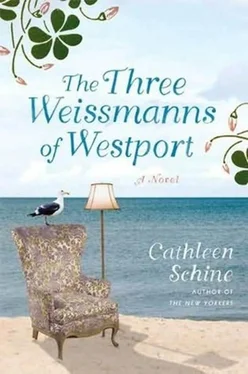It was signed Your Loving Grandma.
They made their exodus from New York to Westport on a beautiful August day.
"It will be just like the commune," said Miranda, who, though her youth had caused her to miss out on the fun of the sixties by a scant couple of years, harbored a rich nostalgia for the period.
"Right. The one in the French Revolution." Had she really agreed to this? Although, when Annie allowed herself to do so, she did have to admit that with both boys gone, she was as lonely as she had ever been in her life.
The three Little Bo Peeps who have lost their sheeps, she thought. Betty minus Josie, Miranda minus the Awful Authors, Annie minus her children. Three minus everything equaled three zeroes. Three zeroes equaled pathos; emptiness; fear. Zero at the bone, she thought. The Emily Dickinson poem made her feel better for a moment. A transport of cordiality. Emily Dickinson made even fear feel rich and full and active.
From the backseat, she looked at her mother's profile as Betty drove her old Mercedes along the Merritt Parkway, exclaiming at the beauty of every stone bridge, remembering when this quaint, narrow, twisting road was new and modern, and Annie felt a wave of respect. Her mother was her own poet. Betty didn't need Emily Dickinson to tell her that seeing a snake dividing the grass like a comb was a shiver of mortality and that mortality was a sign of life. Betty could take pleasure in anything, even this exile. She could make her devastating divorce into a picnic, that word that had made her cry. That is what Josie had always said about Betty's excursions into unlikely optimism. "It's not a picnic," he would say, his voice full of exasperated love, and he and Betty would look at each other and smile. Annie leaned forward, the seat belt tight across her chest, and kissed her mother's cheek.
Betty made a loud kissing noise in response, but kept her eyes on the road. She and her parents had visited Westport frequently in her youth-whenever Aunt Millie checked herself in to the Westport Sanitarium, a large white mansion on the Post Road that then housed wealthy alcoholics and manic-depressives, both of which diagnoses described Aunt Millie. The sanitarium had been torn down years ago and turned into a park.
"Just terrible," Betty murmured, shaking her head at the unfortunate transformation as they drove past the vanished sanitarium, now rolling acres of parkland.
Annie raised her eyebrows and made a face, hoping to catch Miranda's eye in the rearview mirror. But Miranda was gazing out the window at what was now called Winslow Park and sighing in sympathetic, wistful appreciation of the lost mental institution. Miranda always sat in the front. She had gotten carsick in the back, ever since she was a child. As a teenager, Annie had wondered once when they were out driving with their parents if Miranda might not have grown out of it.
"I mean, how can we ever tell, if she never sits in the backseat again?" she asked her mother, who had been banished to the backseat beside her.
"That's the beauty of irony, dear," Betty had said, and Annie never brought it up again.
Now she momentarily panicked at the idea of the months ahead with her sister and mother, then firmly reminded herself that she had finally agreed to the Houghteling Cottage scheme only because she saw that if she did not, the two of them would go ahead without her and live in what they considered genteel poverty until there was not a cent left in either of their bank accounts, at which point they would have to move in with her.
She reminded herself that she still had an apartment, that she had sublet it, furnished, for only ten months. Surely within that time the evacuation to the suburbs would lose its charm for Betty and Miranda.
Betty turned onto a tree-shaded road that eventually led them to the shore. Long Island Sound lay before them in its comfortable modesty, a small, calm stretch of blue. The sky was clear and Long Island, a dark wavy line, was visible on the horizon.
Miranda said, "It's hardly Cape Cod."
"We don't have any cousins in Cape Cod." Her sister had been out to Westport countless times. Did she expect crashing waves and towering dunes?
Still Annie said in a coaxing voice, "Fitzgerald lived here. He and Zelda were kicked out of two houses in Westport, I think."
Miranda seemed mollified. "Two houses," she whispered, looking at the Sound with new respect.
"Zelda swam at Compo Beach," Annie added encouragingly, realizing as she spoke that she could quit the Y in New York and save a little money, swim here herself. "No waves, perfect length, up and down, and you've done your laps…"
"Oh, Annie. You and your laps."
The cottage, on the other hand, was another story. Annie's heart sank when they pulled into the narrow dirt driveway beside the house itself. It was an unpromising sight, a slightly lopsided structure built in 1929, its shingles painted a dull, tired gray. A sunporch ran the length of the front of the cottage, its louvered windows quaint and outdated and yellowed. An overgrown hedge rose on one side of a dirt path leading to the louvered front door. With one corner wedged in the dirt, the rickety gate stood open, as listless as an idling bystander, unconcerned with, unaware of, the ramshackle house. The hard dusty path sidled shamelessly into the patchy crabgrass.
The cottage.
It was a shack, a hut, a garden shed of a thing, stunted and unwashed.
"Oh," Annie said in dismay.
But her sister and mother were already out of the car and exclaiming with joy. It was so unspoiled! It was so old-fashioned, so perfectly old-fashioned! Think of all the barefooted children who had scampered up and down this path! The commuters in their fedoras, tired and grimy from the train! The two women were beside themselves.
"It's like camp!" Miranda cried.
"Girl Scout camp!" Betty cried in response.
Of course, Annie knew well enough that Betty would have tired of real Girl Scout camp the minute she wanted a hot bath and there was only a cold shower to be had, that Miranda would exclaim over the unspoiled nature of the cottage until the first hot night without air-conditioning. But Annie said nothing. She knew better than to confront her mother and sister when they were waxing poetic together. It would be like stepping into a dog fight. One had to wait, patient and quiet, until they wore themselves out.
Annie sometimes reflected that all those poor publishers who thought Miranda was bluffing or bullying had never understood Miranda's secret, which was supreme innocence. She was a good-looking woman: her face animated; her eyes, tapering at both ends, womanly and remote; and she had a slow, curling half-smile that people around her experienced as a moment of recognition, as if they'd been lavishly but secretly praised. When all was said and done, however, Miranda's greatest strength was a sublime ignorance that things could go other than she, in her benevolent excitement, had imagined them. She didn't worry about what the world thought of her or her tantrums, for the world existed only as imagined by her, and Miranda believed in her imagination the way others believed in God or capitalism: it was a force, and it was a force for good.
Annie, who was acutely aware of how the world viewed her, or at least of how she worried that the world viewed her, often watched her younger sister with wonder. Miranda was so unselfconscious that the older sister was deprived of even the bitter satisfaction of envy. In fact, Annie had always been proud of both her sister's beauty and her guileless, autocratic power.
On the other hand, Annie could not help but notice that her sister was extremely self-involved, and over the years, watching Miranda go through one disastrous love affair after another, she began to suspect that Miranda's preoccupation with herself was a kind of protection. Everywhere Miranda looked, she saw the world she insisted upon. This was her great tautological strength. It had fascinated and frustrated Annie since childhood. How could you ever win an argument with such a sister? How?
Читать дальше












